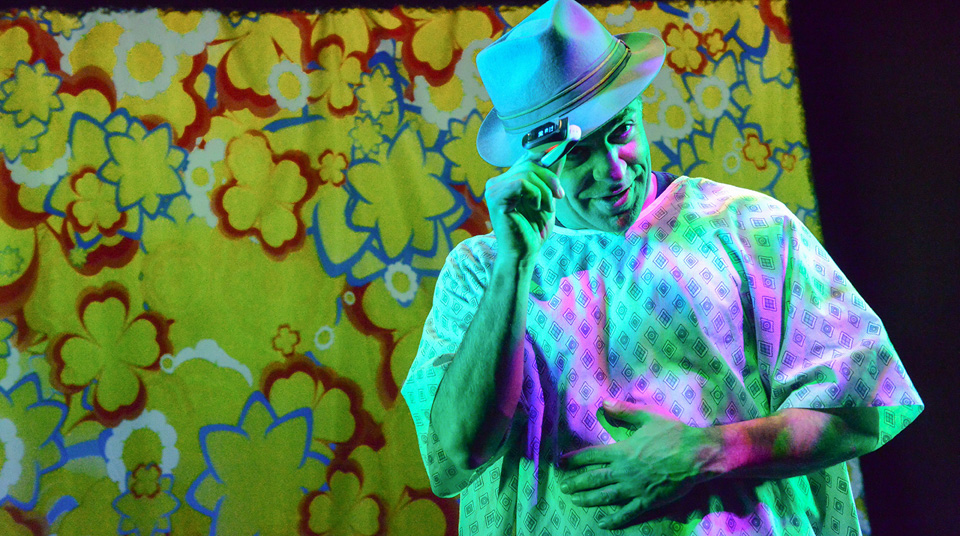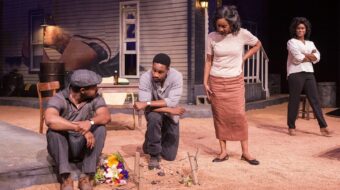
LOS ANGELES — Plasticity, now in an eight-week run at the Hudson Guild Theatre, is an inventively staged, skillfully acted, provocative and often comedic exploration into the expansive capabilities of the human mind. Starring Alex Lyras in a multi-faceted solo performance, and written jointly by Mr. Lyras and Robert McCaskill, who also directed, the world premiere script incorporates the latest scientific findings on neuroplasticity, the brain’s ability to reorganize itself by creating new neural pathways.
The authors look at such themes as resilience, patience, dedication, bottomless love, self-interest, and even sexuality, as a complex visual, social and mental puzzle gets reassembled before our very eyes.
After a traumatic brain event leaves him marooned in a deep coma, with the consciousness of a fetus, David N. Rosely is the seemingly dying star around which a galaxy of characters orbit or jarringly collide. His initials spell out DNR — Do Not Resuscitate. From the outset the audience is enveloped in an integrated, multi-media extravagance as visual projections onto a “scrim sandwich” (one at the back of the stage and one in front), piped-in dialogue, music and sound effects highlight and interact with the loved ones, doctors, hospital personnel and attorneys, all portrayed in split-second sequence by Mr. Lyras onstage. Even Frank Sinatra makes an appearance. For creating this uniquely all-encompassing sensory atmosphere, high praise goes to Corwin Evans (video design), Peter Chakos (editor), Ken Rich (original score), and Matt Richter (set and lighting design).
In quick succession, after meeting our comatose protagonist, the audience is introduced to attending physician, Dr. Rumi Singh, who displays, under such horrifying circumstances, an almost buoyantly over-the-top philosophical bent. A gonzo-style fugitive neurologist, Dr. Leo Azimov (on the lam from a malpractice charge), casts a cynically noirish pall on the proceedings. Fittingly he does not appear in the flesh: His sunglasses-obscured visage is presented exclusively via video projection from somewhere abroad, his trebly enunciation and static, herky-jerky, badly pixelated countenance somehow underscoring the menacing sense of dread hovering over David’s prognosis.
Most central to the unfolding storyline are David’s identical twin brother Grant; David’s fiancée Kate; Kate’s psychotherapist, Dr. Phillip Nitchke; and conniving attorney Edward Fiorenza, all of whom grapple with paradoxical ethical dilemmas or soul-wrenching emotions. Or both. Throw in African-American def-jam poet/hospital orderly Henry Bones, who articulates his own point of view developed over a career of hovering over the near-dead, and Puerto Rican ICU nurse with an attitude, Emilio Sorlacruz, and one marvels at the range, ingenuity and energy deployed by Mr. Lyras.
Costume changes are rapid and take place sometimes only partially offstage, a minor quibble given that the rapid-fire twists and turns of plot, action, character and voice demand such immediate shifts of attention. There is enough stimulation to the senses that the production in its totality ultimately becomes itself another “character” — the marvel of modern stagecraft, brought to you by the latest in video and sound technology. The sophistication of the mise en scène echoes the most advanced experimentation in medicine and brain theory.
Interestingly, Mr. Lyras does not directly portray the lone female character of note, David’s fiancée Kate. Nonetheless, she exerts a powerful influence on the goings-on through the male characters so deeply impacted by her presence in their lives.
In a brief but telling observation made by the Henry Bones character, the treatments and care administered to David, even long after his insurance coverage has expired, are a luxury bestowed only on people of means. At the same time, other considerations factor in as well: Is David perhaps worth more dead than alive? The real-life economic class distinctions and ethics of such selective privilege are of course a reflection of an American health delivery system that is far from optimal for its citizens — and likely soon to get worse!
Embedded in Plasticity are thematic echoes emanating from Dalton Trumbo’s novel Johnny Got His Gun, the thoughts of a severely wounded World War I vet lying in his bed. Some in the audience will chuckle at what can be seen as a borrowed tip of the, ahem, hat, from John Irving’s The World According to Garp.
Neuroanatomist Jill Bolte Taylor’s literally mind-blowing autobiography, My Stroke of Insight, which details her left hemisphere cerebral vascular accident suffered at age 38 (virtually the same age as David Rosely’s trauma) and its aftermath, might also have provided some source material for Lyras and McCaskill. Plasticity also recalls Margaret Edson’s play W;t, the story of a dying cancer patient subjected to medical experimentation in the interest of science.
This courageous, all-encompassing work of theatre raises critical questions about end-of-life issues and the extraordinary measures we sometimes take to preserve life at any cost, all for the prospect of achieving that hoped-for one-in-a-million miracle. We will not, of course, violate the spoiler rule; but we must ask what resources, and whose, are spent to keep people alive. In the Arctic — at least according to lore — the old and infirm are cast out and left to the elements; in mountainous regions they are brought to a high tor for the cycle of life to resume.
Would we even be having the same conversation if our society were more equitable and far less militaristic; in other words, if the resources were there to make life for everyone as long and enjoyable as humanly possible? And who sets the parameters for care?
This is a theatrical experience well worth seeking out. It breaks new ground as a tour de force for the solo actor, for the vigorous freshness of the production itself, and for the discussion that will undoubtedly follow.
Plasticity plays at the Hudson Guild Theatre, 6539 Santa Monica Blvd., Los Angeles 90038 through March 13, with performances Sat. and Mon. at 8 pm, Sun. at 7 pm, and Fri., Mar.10 only. For tickets and information, call (323) 960-7787 or go to www.plasticitytheplay.com.













Comments